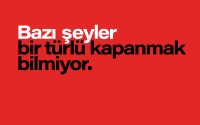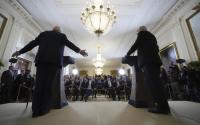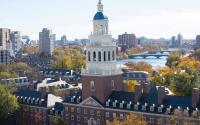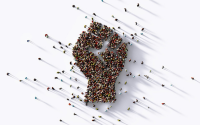25 March 2007Yahoo! NewsChristopher Toothaker
Venezuela - President Hugo Chavez said Sunday that his administration plans to create "collective property" as part of sweeping reforms toward socialism, and that officials would move to seize control of large ranches and redistribute lands deemed "idle."
The Venezuelan leader, speaking on his television and radio program "Hello President," said the government was "advancing quickly" with a concept of "social, or collective, property" to be included in forthcoming constitutional reforms.
"It's property that belongs to everyone and it's going to benefit everyone," said Chavez, who vowed to undermine capitalism's continued influence in Venezuela.
Chavez did not elaborate, but stressed that collective property must benefit workers equally.
"It cannot be production to generate profits for one person or a small group of people that become rich exploiting peons who end up becoming slaves, living in poverty and misery their entire lives," he said.
Government advisers preparing a blueprint for pending constitutional reforms have floated proposals that would roughly define collective property as state-owned assets such as farms that are managed by workers who share profits.
Venezuela's government already helps organize and finance thousands of cooperatives, but the state does not have full ownership of the real estate or infrastructure used by most co-ops.
Chavez, who hosted Sunday's program from a ranch in Venezuela's sun-baked plains, said his government planned to seize control of large ranches and farms spanning more than 740,000 acres and redistribute "idle" lands to the poor under a nationwide agrarian reform.
Re-elected to a fresh 6-year term in December, Chavez has accelerated his push toward socialism by nationalizing Venezuela's largest telecommunications company and the electricity sector, and imposing greater state control over the oil and natural gas industries.
The leftist leader also plans to slap new luxury taxes on the wealthy and do away with presidential term limits that would otherwise bar him from running again in 2012.
Since reform began five years ago, officials have redistributed more than 4.6 million acres of land that had been classified as unproductive or lacked property documents dating back to 1847, according to a recent government census.
Critics say reform has failed to revive Venezuela's agriculture industry, which does not produce enough food to satisfy domestic demand. The government has been forced to import food amid shortages of staples such as meats, milk and sugar.
"If Mr. Chavez really wants to help Venezuela's poor farmers, he must offer them technical assistance and sufficient financing because land doesn't become productive without investment," said opposition leader Alfonzo Marquina. "We're only seeing increasing shortages and more expensive products."
Opponents accuse Chavez, a close ally of Cuban leader Fidel Castro, of steering oil-rich Venezuela toward Cuba-style communism, becoming increasingly authoritarian and dangerously dividing the country along class lines.
Supporters say Venezuela's democracy is as healthy as ever under left-leaning Chavez and applaud president's initiatives to improve living conditions for the poor.






